"Nothing prepares you for the monsters": House of Ashes is channeling Arnie and Aliens for its Dark Pictures threequel
How Supermassive's Dark Pictures Anthology is heading underground to explore the horrors of war

After two reality-testing ghost stories, The Dark Pictures Anthology is swinging into more tangible monster horror territory with House of Ashes. The pitch is pure Aliens meets Descent, with a soldiers vs monsters premise in which an American military unit ends up trapped in an ancient underground temple with… something.
If it bleeds...
The previous two entries in Supermassive's narrative adventure games, Man of Medan and Little Hope, build their scares from much more traditional ghost influences. So it'll be interesting to see how House of Ashes' shift to a more physical monster threat will change the game's mix of jump scares and QTE decision making.
It certainly feels like a good time for a tempo change. Both the last installments played with reality to some extent, leaving you unsure of what was real, and weaving fear from the uncertainty. House of Ashes, on the other hand, is far more real. Well, as real as a 4000-year-old cursed Mesopetamian temple filled with monsters can be. Set during the Iraq War, this follows a team of US and Iraqi soldiers that fall into a network of underground caverns and become trapped with creatures that have been there the whole time.
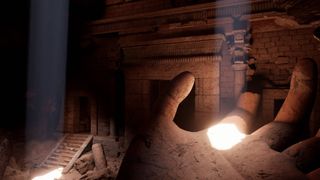
As with all the Dark Pictures games so far, there's a thread of the factual to all this. While Man Of Medan was based on the legend of the Ourang Medan ghost ship, and Little Hope built on the 1692 Andover Witch Trials, House of Ashes is inspired by Naram-Sin; a Mesopotamian king supposedly cursed by the gods.
"This one's more of a creature feature," explains game director Will Doyle. "Each of the games obviously explores different genres of horror, and we've looked at psychological horror and folk horror. This one is definitely what we call exploration horror; which is a group of trained experts, beyond safety, with no backup, and they encounter something horrible."
While the underground creatures of 2006 horror classic The Descent are an obvious reference point here, it's two of the other film influences, Aliens and Predator, that probably better represent the tone for House of Ashes. After two games starring people absolutely not prepared for bad things, this stars a team of soldiers trained for combat, and far more capable of dealing with danger. Even if it is an unexpected threat no one's encountered before. Whatever's in the ruins (veeery long fingers is all I can tell you at the moment), there's a lot of them, and, as Doyle explains, "you can't talk to them, you can't reason with them, you can't understand them. They just purely want to kill you".
We never trained for this
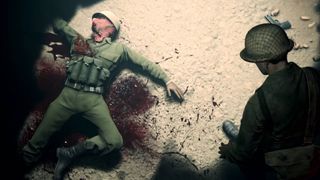
A third supernatural story might have struggled to justify another roller coaster ride of 'it's not real BUT IT IS' twists and turns. However, it's going to be interesting to see how the series handles more direct confrontation. Especially when the cast - including Ashley Tisdale as this episode's famous face - are all fully armed and trained military. "They're trained, but they're not trained for this," counters Doyle.
Sign up to the GamesRadar+ Newsletter
Weekly digests, tales from the communities you love, and more
The gameplay I've seen shows things falling apart pretty quickly once people find bodies, and see companions yanked by invisible hands into the darkness. "For us, it goes back to what the very meaning of horror is, which is putting people into situations that they're not prepared for and seeing what happens to them," says Doyle. "We will build an interesting character up and put them into a position of threat. Then create interesting stories out of that. These people are better prepared, but nothing prepares you for the monsters. This absolute, implacable inhuman creature."
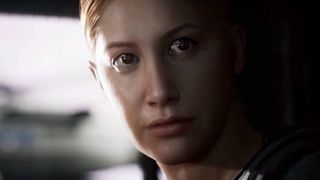
This switch in genre isn't the only adjustment in House of Ashes. There's a fully three-dimensional third person camera this time around, framing almost the entire experience. After Man Of Medan's set camera, fan feedback led to Little Hope's extended third person sections. After more feedback the game has now gone full third person outside of "story moments''. It's a change that might pose a few challenges for a horror game, as framing and camera angles are usually a vital part of building fear and dread.
"It has had an immediate impact on the mood and the kind of tension that you get," explains Doyle. "One thing we're able to author is where the distance of the camera is. So you might find as you move into a spookier area we move that camera closer; it's still under your control, it's just getting closer to your character. If you enter a big epic area we might pull it right out. So we're still using it cinematically but it does mean the kind of scares you might see in Man of Medan, that we used when we had completely fixed cameras, we can't do with the 360 camera."
Weapons hot
Given that 3D camera and cast of soldiers, then, how will House of Ashes handle its almost inevitable depiction of gun fights? "You do have direct control over a lot of the shooting,'' confirms Doyle, adding that "it's done in a more self-contained way that fits the story. We haven't made a run and gun shooter."
"There are some big fights - it does kick off in a big way [but] we keep it to the cinematics. It's always something we try to make feel as movie-like as we can. So there's a lot of shooting that has terrible consequences for failure." Images of Predator's cast cutting the jungle down with machine gun fire, or Aliens' turrets emptying their ammo into dark corridors, springs to mind here.
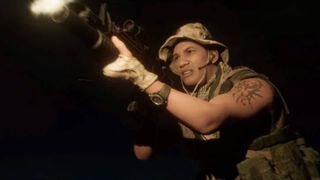
Will and the Supermassive team are also leveraging everything they've learned from the first two Dark Pictures episodes about the anthology's approach to choice-lead narrative, as much as player feedback about cameras. "We have a branching narrative system that works in multiplayer," Doyle points out, "which is a real design challenge to get working. But if we just repeated that in every game we'd have a fixed formula that people would see. So we have to change [and] we've learned a lot more about how to make these stories".
With House Of Ashes, Doyle and the team are hoping to use what they've learned to make an even more enjoyable and varied narrative. " Cinematically, we're close to movies but we have complications - each character has to have a meaningful, playable journey, whereas a movie might focus on one or two people," he explains. Not to mention that anyone can die and the story has to carry on: "Each of those characters has to stand on their own, and has to have their own arc in the story. What's really challenging is when that character can die early [and] that arc still has to feel fulfilling."
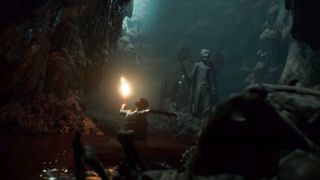
One of the main things I took away from seeing House of Ashes in action was that it does have a much more action movie vibe to its horror. That doesn't change the potential for scares or threat, as there appear to be plenty of monsters, and none of the soldiers seem to pose much of a danger to them. But there's a totally different dynamic to seeing characters that don't flinch at the slightest noise in the dark. One of the advantages of an anthology game is the option to play around with ideas and styles within a familiar framework. I'm really interested to see how this next installment plays out, and hope to see some more adventurous genre switches from the ongoing episodes in the future. I would kill for an isolated The Thing style alien body horror paranoia pressure cooker, after all?

I'm GamesRadar's Managing Editor for guides, which means I run GamesRadar's guides and tips content. I also write reviews, previews and features, largely about horror, action adventure, FPS and open world games. I previously worked on Kotaku, and the Official PlayStation Magazine and website.
Most Popular
